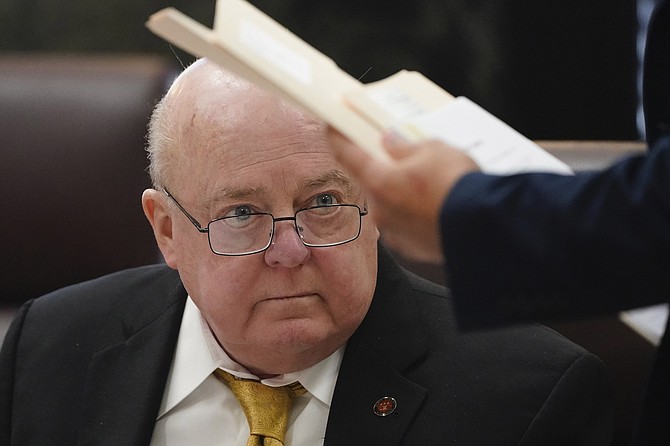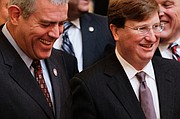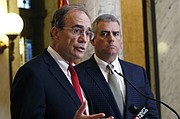Sen. John Polk, R-Hattiesburg, who represents a certified retirement city, is concerned that eliminating the state income tax and raising the sales tax would harm the older residents of his district. AP Photo/Rogelio V. Solis
Mississippi Sen. John Polk, a Hattiesburg Republican, has a concern about House Republican leaders’ tax reform plan: The 72-year-old lawmaker plans to run for re-election in two years, but as a representative from a certified retirement city, he worries that raising the sales tax in order to pay for eliminating the state income tax could hurt his older residents.
“My seniors, who are retired, don’t fit that category. They don’t pay income tax on the majority or all of their income,” Polk said during an Aug. 26 Tax Study Committee meeting at the Legislature. “But they will pay a 36% higher sales tax. How do I get re-elected when I tell them I supported that? Is there something that can be done, in your opinion, that would hold them harmless?”
Ron Mau, an economist from the University of Mississippi who was there to explain his support for eliminating the income tax, acknowledged that “people of different ages will feel this change differently.” Young workers, he said, would be able to save more money under the House GOP tax plan because their tax burden would be lower.
“So with regards to your constituents, I would encourage them to think about the sacrifice they are willing to make for the young people of the state, including their own relatives that will benefit substantially from this compounding effect of eliminating the income tax on their personal savings,” Mau told Polk.
“So your answer that I should give them is you worked hard for 40 years, you fulfilled your obligation to the state of Mississippi, here’s the bus, get under it, I’m going to throw you under it,” Polk replied.
“I would not use that language in any capacity,” Mau replied, telling the Hattiesburg senator that the right question was whether or not the costs to some “outweighs the benefit to the people of Mississippi” overall.
Polk answered with a curt, “hmph.”
Republican House Speaker Philip Gunn pointed out that Mau is a “Notre Dame graduate” with a “Notre Dame grade education” as he sought to ameliorate Polk’s concerns. Older Mississippians spend less than younger ones, Gunn pointed out, and the State does not tax mortgages or medicine. The House tax plan would also cut the grocery tax in half, he noted, which could benefit older Mississippians, too.
The speaker admitted that older Mississippians “may not reap the benefit of the income tax.” But, he said, they “can give that gift to (their) grandkids of a life free of an income tax.”
The split demonstrated the rift between House and Senate Republican lawmakers that has kept the tax debate at a standstill, with prevailing forces in the state leadership leaning heavily toward abolishing the income tax. Still, no proposal that satisfies all players has yet to emerge from the discussion, which follows a failed attempt to push the tax cut through the 2021 legislative session.
The Mississippi Legislature’s Joint Tax Study Commission met the week before last, including voices ranging from progressive policy outlet One Voice MS to anti-tax stalwart Grover Norquist of Washington, D.C., himself.
What emerged was less an evolution of Mississippi’s grasping at income tax abolishment and more a retrenchment of the interested parties.
Reeves: ‘I’m Opposed to Robbing Peter to Pay Paul’
At the heart of the tax debate is a series of contradictory goals in tax reform. While all of the state’s top political leaders have shown some degree of interest in reducing income taxes, each has expressed a different concern about the shifting burden on taxpayers and budget concerns.
House Speaker Philip Gunn, R-Clinton, is the most flexible, driving the debate with a plan that would hypothetically achieve a rapid end to income tax without slashing revenue by raising sales taxes 2.5%.
“No one is having a tax burden that is going to all of a sudden explode or mushroom,” Gunn promised. “We as a state are going to be better off economically for our citizens, economically and in terms of prosperity.”
Gunn is a member of the American Legislative Exchange Council, or ALEC, where he served as chairman of the board of directors throughout 2020. ALEC, an Arlington, Va.-based pro-business organization made up of conservative lawmakers and corporate interests, drafts “model legislation” that often shows up in legislatures across the state. The corporate-funded nonprofit has long urged state lawmakers across the country to eliminate their states’ income taxes.
Gov. Tate Reeves is equally bullish on abolishing income tax, but opposes Gunn’s revenue balancing measure. On social media and during his now infrequent COVID-19 press conferences, the governor’s message has remained crystal clear.
“I hope that once the hearings are over, the Legislature will realize that the best way forward is to not swap the income tax for increases in sales taxes, agriculture taxes and other taxes,” Reeves wrote prior to the tax hearings.
“I’ve said it before, and I’ll say it again, I am absolutely opposed to taking less from you here and taking more from you there. I’m opposed to robbing Peter to pay Paul,” Reeves concluded.
This puts them both at odds with Lt. Gov. Delbert Hosemann, whose command of the Senate gives him a strong hand on the progression of any tax bill arriving in the next Legislative session.
Late last year, Hosemann told this reporter that a pure cut to revenue was unacceptable.
“It’s a $2-billion dollar question,” Hosemann said. “I am open to any solution to that. But, until we have a solution … it’s not ‘Field of Dreams.’ I don’t print money. We have to have enough funds to pay for highway patrol, education, all the other things we pay for as a state.”
But would he accept a regressive reshuffling of the tax burden, meaning a plan that further increases the money derived from poorer Mississippians while lessening the burden on the rich? “No,” he said.
Regressing a Regressive System
Regressive burdens of eliminating the income tax was one of the key discussion points at the commission hearings at the Mississippi Capitol last week.
Kyra Roby, policy analyst at One Voice MS, a progressive policy institute, addressed the panel to warn of the disproportionate effect of a sales tax-income tax swap. One Voice just released a report
“Mississippi’s current tax system is regressive,” Roby said at the hearing. “The state’s tax system, as in most states, is driving a wedge between high- and low-income earners, which ultimately contributes to worsening income inequality.”
An Institute on Taxation and Economic Policy study from 2018 shows the relative burden of taxation across Mississippi. The bottom 60% of Mississippians, earning 43,600 or lower, alone pay more than 10% of their gross family income on taxation.
That relative burden sharply declines for the wealthiest Mississippians. The top 5% of earners in the Magnolia State, those who make $162,200 or more, already pay a considerably smaller amount in taxes. Roughly 6.5% of their family income is diverted to taxation. The wealthier 40%, including many if not all in state office and the Legislature, would see the greatest benefit from any configuration of income-tax abolishment schemes. The same top 5% pays the highest share of personal income tax.
Gunn estimates that his proposed sales-tax increase to offset the $1.8 billion in income-tax revenue losses would generate an additional $2.2 billion for the state coffers. The nearly half a billion in additional revenue could be reinvested into Mississippi’s underfunded public services, but much of that money would come straight from the pockets of the poorest Mississippians. For the bottom 60% of the state, the ITEP analysis shows that a flat majority of tax burden comes from sales tax.
The calculus is simple. Low-income earners have more of their paychecks consumed at the point-of-sale, on food and necessities. Gunn’s plan intends to offset a portion of that inequality by further reducing the state’s “grocery tax,” from 7% to 3.5%. The increase would continue to affect all non-food consumer purchases.
Good Policy, or Greatest Policy?
In spite of the zeal of tax reformers from inside and outside the state, many Mississippi business leaders have challenged the notion that income taxes are a priority for economic development—particularly at the expense of high sales taxes.
As Geoff Pender reported at Mississippi Today, Mississippi Chamber of Commerce President Scott Waller directly contradicted Gunn’s eagerness for the elimination of personal income tax. “Mr. Speaker, (personal income tax) has not come up a single time as a priority, something we want to do,” he said at last week’s hearing.
Gunn responded testily, saying that the Chamber’s concerns had been adequately addressed. “I don’t know if there’s anything greater or better we could do for the citizens from a financial standpoint than to eliminate the income tax and put more money back into their pockets,” Gunn said.
But why the shift? Sen. Hob Bryan, D-Amory, asked if a reverse tax-swap plan would serve the same purposes. “Based on your last comment I assume that if we lowered the sales tax and increased the income tax, but we increased the income tax less than we were lowering the sales tax—a net cut—that would be good policy?”
Russ Latino, president of Empower Mississippi, a conservative think tank, assured the senator that the devil was in the details. “This is where the devil comes into play, Hob,” Latino said. “That would be a situation in which you are reverting to a tax that is not as efficient as a consumption tax. You’re reverting to a tax on productivity itself, which just decreases productivity.”
“So, basically you’re just in favor of a sales tax, and you’re opposed to an income tax?” Bryan asked pointedly.
“I’m in favor of eliminating it because I think it will help the state of Mississippi. So, yes,” Latino responded.
Hob Bryan v. Grover Norquist
The raison d’etre for an income-tax reduction, in the eyes of its supporters, is economic growth. ITEP’s analysis found that “[s]tates with high top tax rates fared better than states without income taxes during the pandemic. Compared to no-tax states, states with high top rates saw faster average income growth and lower unemployment rates.”
“I understand it is your goal to shrink government until it gets so small you can drown it in a bathtub,” Sen. Bryan said during the Aug. 26 hearings.
He was speaking to Grover Norquist, a lobbyist and the founder of Americans For Tax Reform, a group that enlists lawmakers in its “Taxpayer Protection Pledge” by getting them to sign a promise not to vote for tax increases on individuals or businesses.
“No, it is not my goal to shrink government to where it disappears,” the lobbyist told Sen. Bryan. “It is my goal to have the government grow more slowly so it becomes half as expensive to people over a 25-year period. I’ve written books on the subject if you’re interested.”
“But you did say you wanted to shrink government to the size where you can drown it in a bathtub,” Bryan said, referring to a comment the lobbyist made during a 2001 interview with National Public Radio.
Norquist acknowledged the remark, calling it a “pretty good” quote, but accused Bryan of taking it out of context. “We just want to make it very teeny. That’s my point.”
Though dissatisfied with the lobbyist’s answer, the Amory Democrat moved on to his next question, hearkening back to 1987, when he was still a first-term state senator.
“We had a four-lane highway program back in the 1980s, and the Legislature increased the gas tax to help pay for that,” Bryan said.
Until 1987, Mississippi had just two major four-lane state highways: U.S. Highway 49 and U.S. Highway 82. The $1.3-billion Four-Lane Highway Program of 1987 helped fund more than 1,000 miles of new four-lane roads across the state.
“If you had been in the Legislature in the 1980s would you have voted no?” Bryan asked Norquist.
The lobbyist said he would “recommend what New Jersey did” to fund new roads: “Get an offsetting tax cut and what you can do is prioritize roads. You say we’ll raise the gas tax and cut other taxes so it’s not a tax increase.”
“That’s not the choice you had, Mr. Norquist,” Bryan said, inviting the lobbyist to imagine himself as a 1980s Mississippi lawmaker. “There’s a conference report that it’s going to increase the gasoline tax by several cents over a period of years, and it’s going to construct four-lane highways. You’re a legislator. You’ve got to vote yes or no. How would you have voted?”
“Well, as a legislator, I would have done my homework and organized the pro-taxpayer people in the Legislature to say roads are good, it’s one of the things government does that’s actually productive and helpful. Why don’t we organize that by having the gas tax pass and in the same bill cut the income tax or the sales tax or some other tax? That’s what you do. You don’t wait until someone gives you a false choice.”
Norquist noted that his organization had already successfully argued for such policies before lawmakers in states like New Jersey and South Carolina.
“Apparently, it’s all our loss that you weren’t here in the 1980s so you could’ve handled that,” Bryan said before moving on to the next topic. “Are you concerned at all with the concentration of wealth in this country where every statistic you look at over the past several years or decades has shown a greater and greater concentration of wealth among the wealthiest people in the country at the expense of those who are less well off?”
Norquist rejected the question, saying he believes that it is good for everyone when “guys” like the ones who founded Walmart and Amazon “get rich making us all richer and more successful because the cost of goods are lower.”
“And I’m better off, and you’re better off. … Earned wealth is good wealth,” Norquist said, saying he opposes “the politics of envy.”
The raison d’etre for an income-tax reduction, in the eyes of its supporters, is economic growth. ITEP’s analysis found that “[s]tates with high top tax rates fared better than states without income taxes during the pandemic. Compared to no-tax states, states with high top rates saw faster average income growth and lower unemployment rates.”
Norquist, who was visiting Mississippi as part of his unending crusade against taxation, pointed out that two large Republican-led states with no income tax are performing well economically.
“Why did Texas and Florida and others have all this money, (these) people who make income move into those states. … I hear from time to time, people like big government. They like lots of spending. Let’s look at the top 10 spending states per capita and the lowest 10. People are moving into the lower tax spending states,” he said, pointing
The ‘Kansas Experiment’ and ‘Oklahoma Debacle’
But eliminating the state income tax has not worked out as well in other states that did so. The non-partisan Parents’ Campaign, which focuses much of its lobbying efforts on public-education funding, expressed concerns earlier this year about how similar tax system overhauls in other states have played out. They cited Kansas, where former Gov. Sam Brownback signed legislation eliminating its state income tax in 2012, and Oklahoma, where lawmakers under both Democratic and Republican leadership have repeatedly passed cuts to the state income tax since 2004.
By 2017, The Washington Post reported, “a deepening budget crisis” in Oklahoma had “forced schools across the Sooner State to make painful decisions” with ballooning class sizes, cuts to art and foreign-language programs and children going without textbooks. About one-fifth of Oklahoma’s public-school districts have now cut the school week from five days to four in order to keep classrooms open under severe budget strains.
Kansas Republicans based their 2012 reform package on ALEC-authored model legislation that Gov. Sam Brownback claimed would herald the dawn of “a midwest renaissance rooted in the Reagan formula.” Norquist, who told ALEC in 2013 that he was “all in favor of chopping off the heads of people who commit murder” as part of reforming criminal justice in a way that can save taxpayers money, also backed the Kansas bill. In 2014, he called Brownback’s signature legislation “the right thing for the economy.”
Within three years, though, the consequences for the state became unbearable even for many Republican lawmakers who had supported it.
“It was a catastrophe. Ditto for the Oklahoma debacle,” the Parents’ Campaign said in its newsletter earlier this year. “In the four years following the Kansas tax cut, the state suffered nine rounds of budget cuts, three credit downgrades, and what The Atlantic called ‘an ongoing atmosphere of fiscal crisis.’ School budgets and other state services were decimated. In 2017, facing a furious electorate, the Kansas Legislature waived the white flag and rolled back the tax cuts.”
When the “Kansas Experiment” ended in 2017, and the state revived its income tax, Norquist told The Atlantic that he blamed interest groups, such as teachers’ unions for the experiment’s demise. Because of their influence on lawmakers, he said, the state’s legislature was “unwilling to do the spending restraint necessary.”
“Kansas is an outlier,” Norquist told The Atlantic. “If you’re a Republican looking for a model, Kansas is not the model.”
In the years since bringing back the state income tax, Kansas has rebounded from its crippling budget deficits and, instead, began experiencing budget surpluses. At the hearings in Mississippi last week, Norquist insisted that, despite an overall poor outcome, Kansas’ income tax elimination “did spur growth.”
“It did spur jobs,” the lobbyist said.
‘Marginal Effects’
During the hearings, Corey Miller, Mississippi’s own state economist, challenged the primacy of income tax entirely in his testimony before the commission. “In my view, the lack of consensus … on the effects of state tax systems on regional economies points to the limits of fiscal policy at the state level is also in line with the findings of research by (the University Research Center), which is that changes to state taxes in Mississippi are likely to have marginal effects on economic growth, employment and population,” he said.
Miller’s position suggests that both Norquist and ITEP’s analysis, taken unexamined, may confuse correlation for causation. Mississippi is a small state with an even smaller urban footprint. The overwhelming trend in the past decade has been urban growth and rural decay. If Miller is correct, more direct causes undergird national trends in growth and development than any tinkering with tax policy.
“A 2014 study … concludes that the national economy is the single most important influence on the economic environment of a state,” he continued. “I believe this conclusion is particularly true for a state like Mississippi with a relatively small economy.”
This story originally appeared in the Mississippi Free Press. The Mississippi Free Press is a statewide nonprofit news outlet that provides most of its stories free to other media outlets to republish. Write shaye@mississippifreepress.org for information.









Comments
Use the comment form below to begin a discussion about this content.